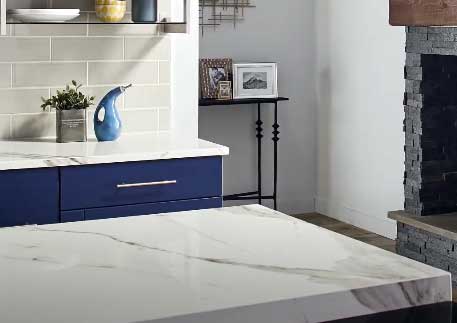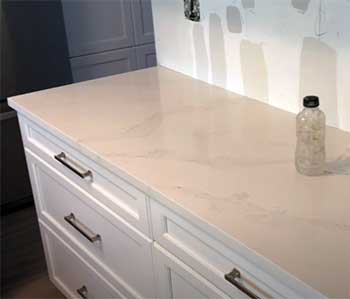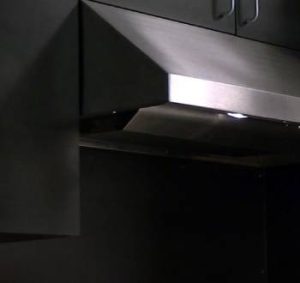When you’re setting out to revamp your kitchen or bathroom, countertops are one of the main features you’ll consider. If you’re looking at quartz countertops, two names likely stand out: MSI Quartz and Silestone.
This article delves into the pros and cons of each, helping you make the most informed choice for your project.
A Brief Comparison Table
| Features | MSI Quartz | Silestone |
| Heat Resistance | Less resistant | More resistant |
| Color and Pattern Variety | Extensive range | Limited range |
| Cost | Generally cheaper | Generally pricier |
| Bacteriostatic Protection | No | Yes |
| Durability | High, but seams can be visible | High, but may discolor over time in direct sunlight |
| Integrated Sink Option | No | Yes |
The Lowdown on MSI Quartz

A leading North American distributor, MSI offers a wide range of flooring, wall tile, and countertops, including quartz.
MSI Quartz is highly regarded for its sleek aesthetics, impressive durability, and affordability.
But how does it really stand up to scrutiny?
Pros of MSI Quartz
- Variety: MSI Quartz’s strength lies in its extensive color palette and design range. From the purest whites to the darkest blacks, the choice is yours.
- Durability: Quartz, in general, is known for its durability, and MSI Quartz is no exception. It’s scratch and chip-resistant, which makes it a solid choice for high-traffic areas.
- Affordability: MSI Quartz is one of the more affordable quartz countertop options in the market, which can be a deciding factor for many homeowners.
Cons of MSI Quartz
- Not As Resistant to Heat: Although MSI Quartz is durable, it’s not as heat resistant as natural stone. Placing hot pots directly on the surface can result in damage.
- Seams are Visible: Depending on the slab’s color and pattern, seams can be visible with MSI Quartz, which can affect the overall aesthetic.
The Scoop on Silestone
Silestone is a compound made up of 94% natural quartz, making it extraordinarily hard and resilient. Manufactured by Cosentino, it’s a popular choice for kitchen and bathroom countertops. But what are its pros and cons?
Pros of Silestone
- High Heat Resistance: Silestone is more resistant to heat compared to MSI Quartz. This added benefit allows more flexibility when it comes to kitchen use.
- Integrated Sink Option: Silestone offers an integrated sink option, which creates a seamless aesthetic from countertop to sink.
- Bacteriostatic Protection: Silestone is the only brand that offers a unique bacteriostatic formula that improves hygiene levels.
Cons of Silestone
- Higher Cost: Silestone tends to be pricier than MSI Quartz, which can be a deterrent for some homeowners.
- Less Variety: While Silestone offers a range of colors and patterns, its selection isn’t as broad as MSI’s.
- Possible Discoloration: Silestone may discolor over time when exposed to direct sunlight, making it a less optimal choice for areas with intense sun exposure.
Key Differences Between MSI Quartz and Silestone
Understanding the key differences between MSI Quartz and Silestone can provide you with the insights necessary to make the best decision for your home.
Here are some key aspects where these two types of quartz countertops diverge:
- Heat Resistance

While both Silestone and MSI Quartz can handle the daily demands of your kitchen or bathroom, there’s a noteworthy difference in their heat resistance.
Silestone has a higher heat resistance compared to MSI Quartz.
Thus, if your kitchen activities often involve hot pots and pans, Silestone might be the more practical choice.
However, remember that both surfaces should be protected from direct heat exposure whenever possible to maintain their integrity and appearance.
- Variety
In terms of variety, MSI Quartz takes the cake. It offers a broader spectrum of colors and patterns compared to Silestone.
This wide selection allows homeowners to find the perfect match for their aesthetic preferences, whether they’re looking for a classic white countertop or a bold, patterned surface.
- Price Point
The cost is another significant difference between the two brands. MSI Quartz is generally more affordable than Silestone, which can make a considerable difference for homeowners working with a tight budget.
However, the higher cost of Silestone might be justified for some, given its higher heat resistance and its unique bacteriostatic feature.
- Hygiene
Silestone has a unique selling point with its bacteriostatic protection. This means that the surface has been treated to limit the growth of bacteria, providing an extra layer of hygiene.
This could be a deciding factor for families with young children, or anyone who wants their kitchen or bathroom to be as hygienic as possible.
- Durability
While both surfaces are durable and long-lasting, there are slight differences in their performance over time.
Silestone may discolor if exposed to direct sunlight over a long period, whereas MSI Quartz can show seams more easily depending on the slab’s color and pattern.
- Integrated Sink Option
Silestone provides an integrated sink option, which MSI Quartz does not. This feature allows for a seamless transition from countertop to sink, creating a sleek and modern aesthetic.
Also Read: Should You Have LG Viatera Quartz?
FAQ: Your Top Questions Answered
The answer depends on your specific needs and preferences. If you prioritize heat resistance and improved hygiene, Silestone may be the better choice. However, if you prefer a broader selection and a more budget-friendly option, MSI Quartz might be a better fit.
MSI Quartz is renowned for its quality and durability. While it might not be as heat-resistant as Silestone, its lower price point and broad selection make it a popular choice among homeowners.
While MSI Quartz is more affordable than some other options, it doesn’t compromise on quality. Its high durability and wide range of stylish designs ensure it competes with more expensive brands.
“Cheap” can sometimes imply a lack of quality, but that’s not the case with MSI Quartz. While it is more affordable than brands like Silestone, it offers exceptional durability and a range of attractive designs.
The Bottom Line
Your choice between MSI Quartz and Silestone will depend on your budget, design preferences, and practical needs.
Both options have their strengths, and understanding these will help you choose the best quartz countertop for your home.



